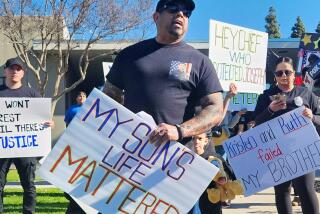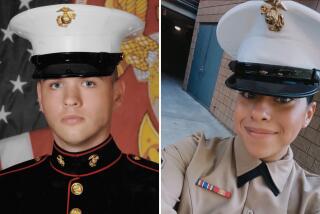Never Forgotten : Newhall: Families and colleagues gather to pay tribute to four men killed 25 years ago in the Highway Patrol’s worst tragedy.
- Share via
SANTA CLARITA — In a time when violent shootings are tragically common, a multiple murder that took place 25 years ago today is still remembered as one of the most heinous in Southern California history.
On April 6, 1970, four rookie California Highway Patrol officers responding to a routine call in Newhall were gunned down in a restaurant parking lot. The incident remains to this day the most tragic ever for the CHP.
Yesterday, in Newhall, about 100 family members, friends and co-workers gathered at a CHP station about a mile from the site of the gun battle to commemorate the anniversary of the deaths. Many remembered the incident as one that not only wreaked havoc with the lives of those close to the officers, but also sent shock waves through police agencies nationwide.
“Instantly, for law enforcement officers across the nation, Newhall was not a place,” said Newhall CHP Capt. Greg Augusta, in an address to the audience outside the station. “It was an incident.”
Killed were Walter C. Frago, 23; George M. Alleyn, 24; James E. Pence Jr. 25, and Roger D. Gore, 23. All were married and had children.
During the commemoration ceremony, about 30 CHP officers stood at attention as four blue wreaths with yellow ribbons were placed by pictures of the slain officers near a permanent memorial to them at the entrance of the station.
After the ceremony, relatives of Gore and Frago said the show of support helped offset the pain of reliving the deaths.
“Every time I see an officer with a badge, I just want to go up and hug him,” said Bertha Gore, Roger’s mother.
Her husband, Max, committed suicide in 1986 because, family members said, of his longtime depression over his son’s death.
“I’m so shocked to see so many people here after 25 years,” said Walter Frago’s widow, Nikki. “I was thinking by now he’s not important to anybody but us.”
But officers who were on duty that night said they can’t imagine anyone ever forgetting what happened.
“I think about it every time I drive by a unit that’s made a stop,” said Roger Palmer, 50, a retired CHP officer who was in the second car to arrive at the scene after the shooting. “And of course every year at this time it comes up.”
*
CHP and other law enforcement agencies revised their training procedures following the incident. They altered the way officers handle weapons and approach cars during traffic stops. Law enforcement officers in training were made to study the Newhall shootings.
“For years this was a training exercise that was re-enacted at our training academy,” said Lt. Barbara Persten, head of the detective bureau at the Santa Clarita Valley Sheriff’s Station.
The tragic incident began shortly before midnight April 5, 1970, when Jack Twinning, 35, and Bobby Augusta Davis, 29, brandished guns at a motorist after a near-collision in Gorman, according to a published CHP account. Court records show both were North Carolina residents who had served time in prison and were planning to kidnap bank executives in Los Angeles for ransom.
Officers at the ceremony said that reports of weapons were not unusual in what was then a fairly rural area.
Gore and Frago were sent to investigate the incident. The officers spotted Twinning, and Frago parked outside of what was then J’s Coffee Shop (now the site of a Marie Callender’s restaurant near Magic Mountain) west of the Golden State Freeway.
The two officers approached and began to question Twinning and Davis, according to the account. Without warning, the officers were both shot in the chest.
Pence and Alleyn arrived shortly afterward, and a gun battle ensued that left both officers dead. Twinning and Davis escaped into the night.
More than 200 officers participated in a nine-hour manhunt for the pair. Twinning was discovered near the Newhall CHP station at a house where he briefly held a man hostage.
When officers stormed the house using tear gas, Twinning “committed suicide by placing the muzzle of the CHP shotgun, stolen from one of the officers, under his chin and discharging the weapon,” according to the CHP account.
Davis had stolen a camper and had tried to drive to the Antelope Valley on San Francisquito Canyon Road, but was captured by sheriff’s deputies. Newspaper accounts said Davis smiled as he was convicted in November, 1970, of first-degree murder.
He was sentenced to death, but the punishment was revised to life in prison when California’s capital punishment law was declared unconstitutional in 1972.
Davis now spends 22 1/2 hours a day in a solitary cell in a high-security unit at Pelican Bay State Prison, which houses the state’s most serious offenders, said Tom Hopper, community resource manager for the prison.
“He’s considered a high escape risk and he has enemies (among inmates),” Hopper said.
Davis declined to be interviewed.
The convicted murderer has been turned down for parole seven times, Hopper added. Many at Wednesday’s ceremony said they weren’t surprised.
*
“He’ll never get out,” said CHP Sgt. Harry Ingold, 51, the first officer to reach his slain co-workers after Twinning and Davis fled the scene.
Standing by the memorial was Joseph Walter Frago, 11, the adopted son of Nikki Frago, who has never remarried. The boy watched the commemorative ceremony quietly, sitting next to his mother. On his wrist was the watch that Walter Frago was wearing on the night that he was killed.
When the ceremony ended, old friends consoled each other as Joseph looked on.
“I just wish I could see him one time in his life,” the boy said. “I’d tell him, ‘Be careful when you’re out on your duties.’ ”
More to Read
Sign up for Essential California
The most important California stories and recommendations in your inbox every morning.
You may occasionally receive promotional content from the Los Angeles Times.













